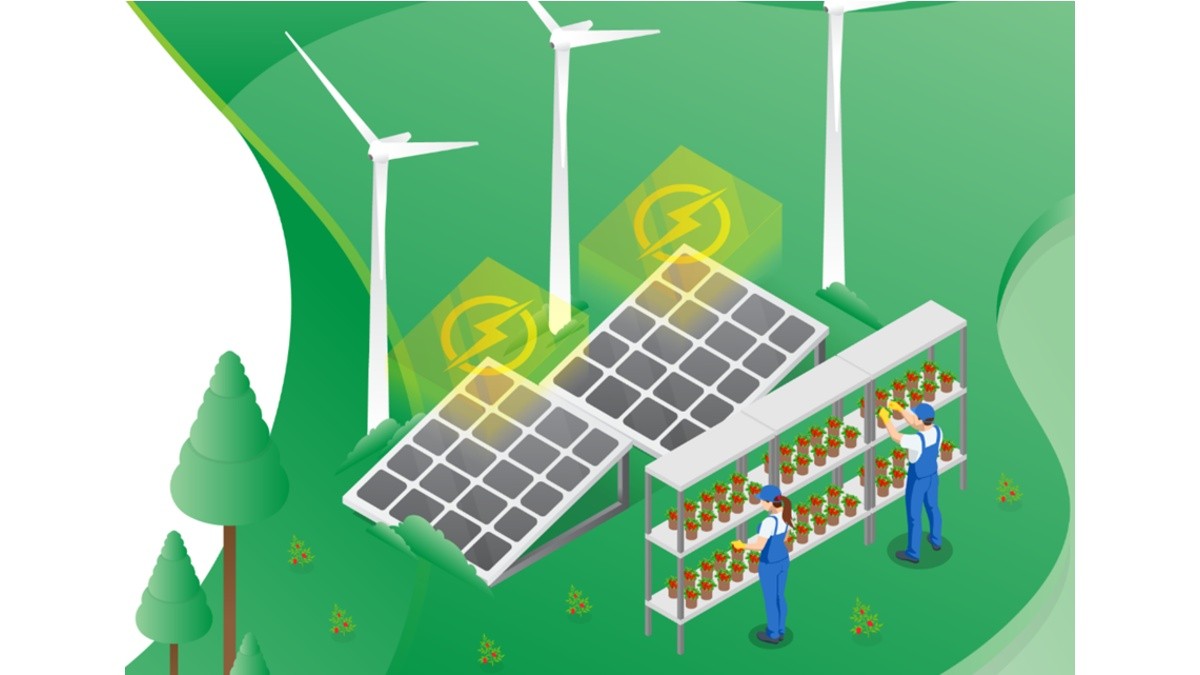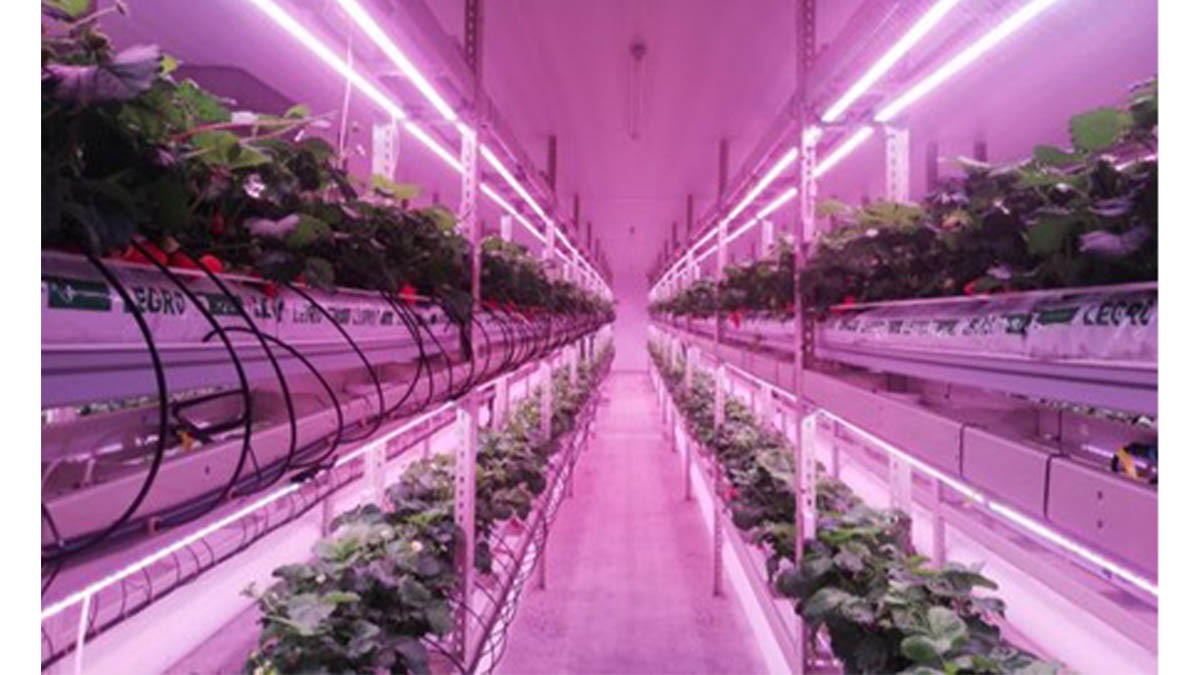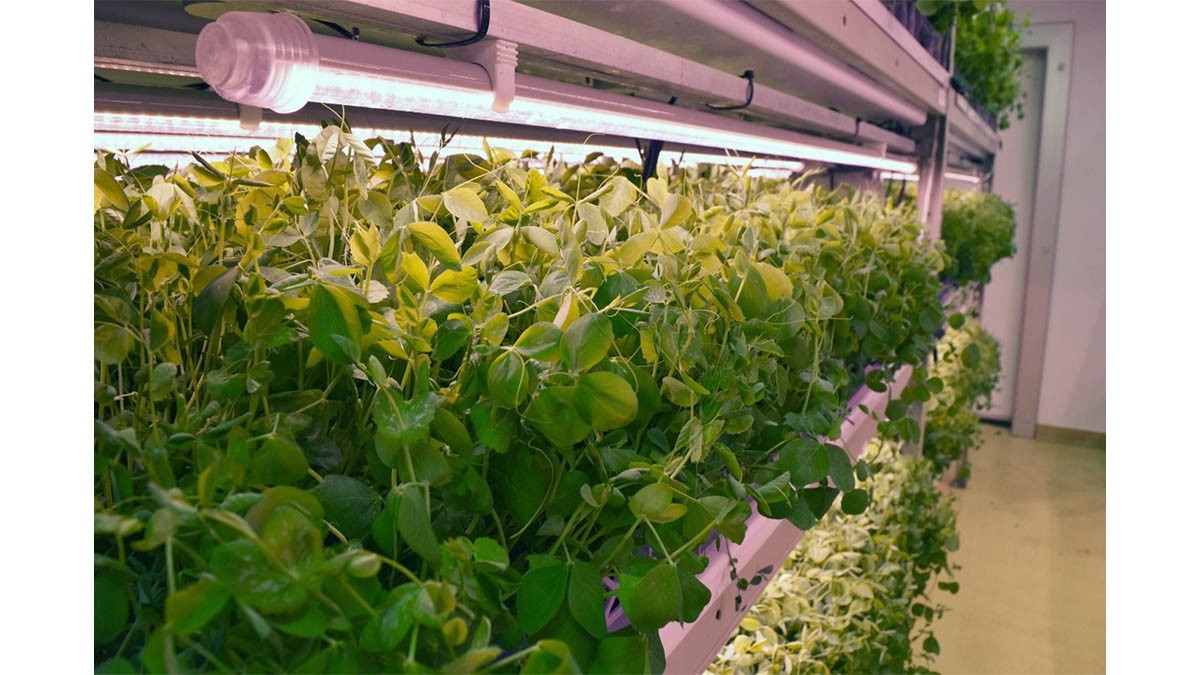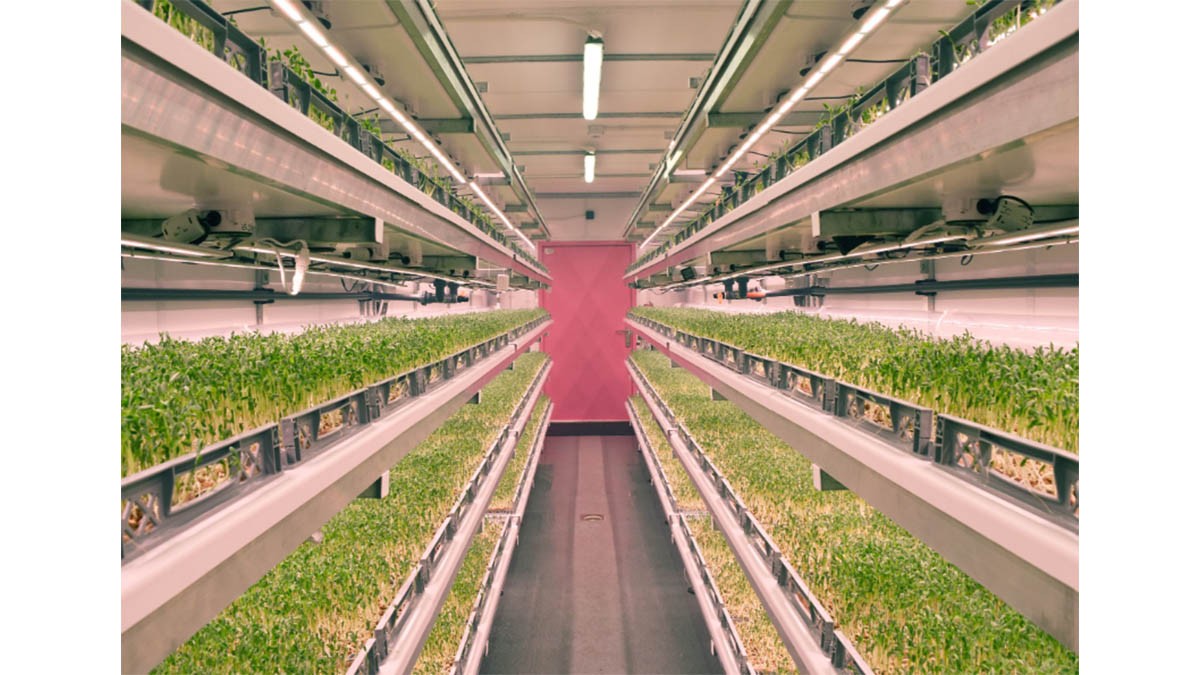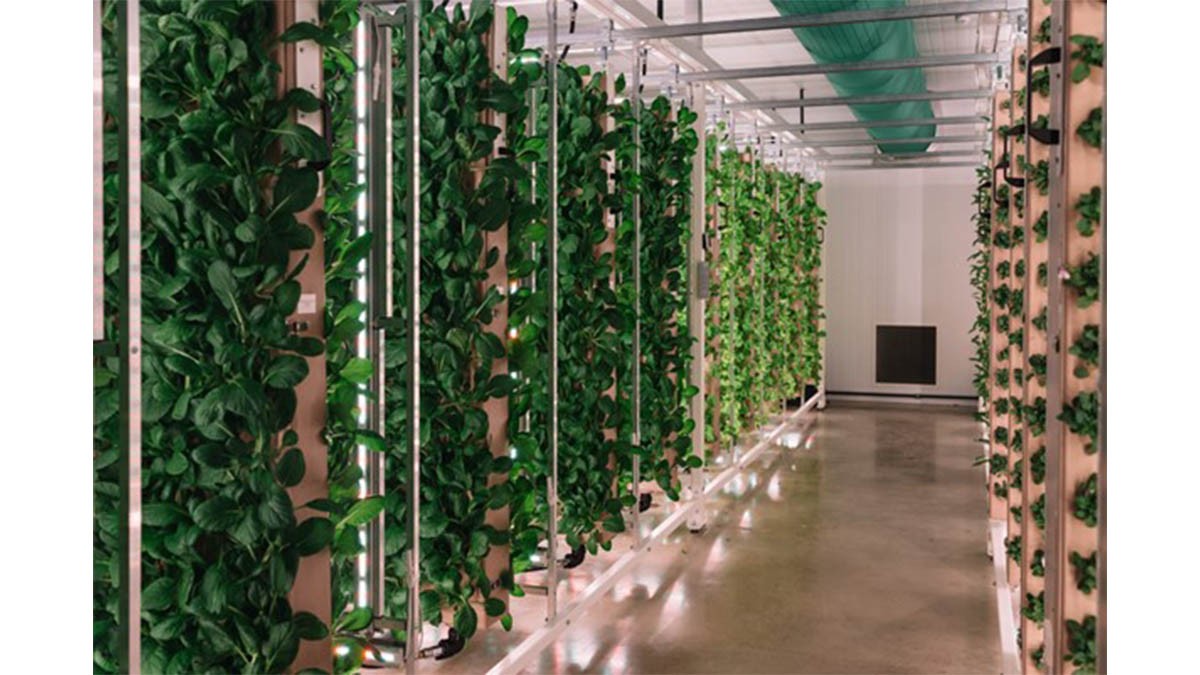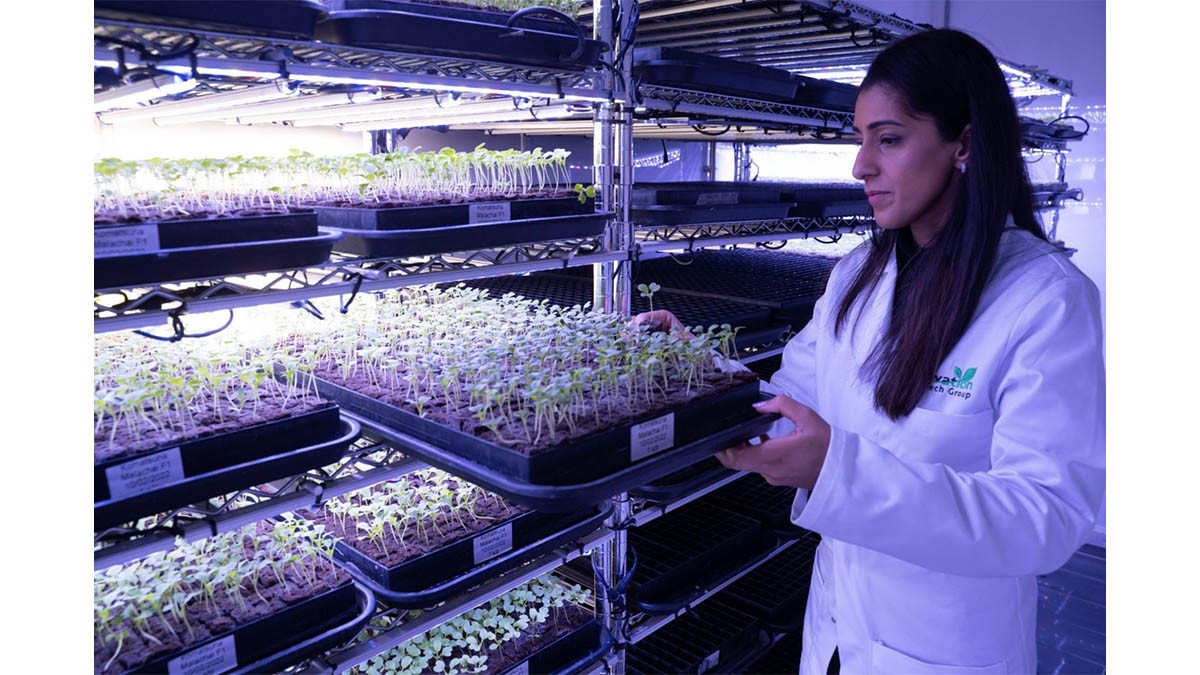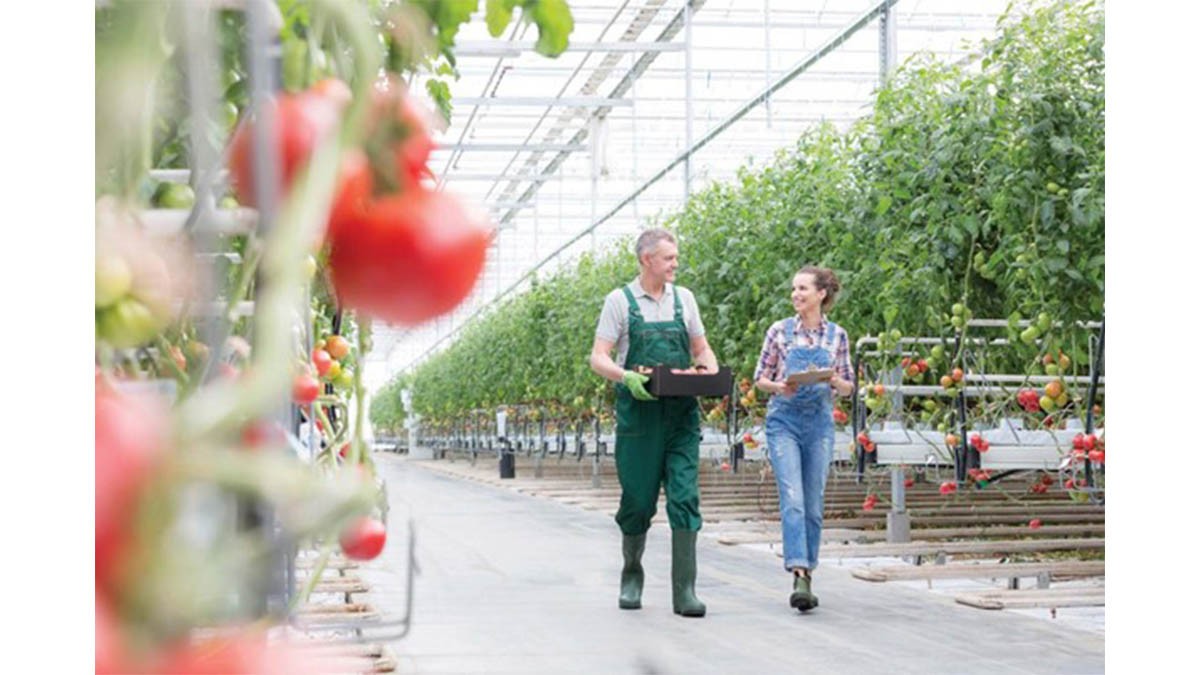Vertical Farming to Improve UK Food System Resilience (VF-UKFSR)
Overview
Our changing environment, political unrest and the threat of further pandemics all place risk on how we ensure continued access to high-quality nutritious food. Vertical farming (VF) is a means of producing food in a totally controlled environment utilising soilless technology and artificial lighting. This innovative approach to agriculture offers an additional tool to increase UK food system resilience, through higher yields, greater land- and resource-use efficiency, year-round production and a decoupling from weather systems. This project is using a whole-system approach to quantify how VF can address key vulnerabilities in the UK food system, whilst co-creating a pathway for innovators to fulfil this potential.
Project aims
The impact of climate change is the biggest medium- to long-term risk for UK domestic food production. This is not limited to the UK, but also affects global food supply chains, upon which we are heavily reliant. Relying on imports brings associated risks from volatilities in energy prices, global conflict or civil unrest, all impacting both food supply and prices. There is fierce debate about the future of food and farming policy: how do we strike a balance between biodiversity, food security and Net Zero goals, in the face of competition for land from renewable energy, land-based greenhouse gas removal, and urbanisation/development. With the UK at its highest ever level of risk, and a food system which is precariously balanced, there is a pressing need to understand how to sustainably increase domestic production on land which suffers the impacts of climate change and is in competition with other uses.
Vertical Farming (VF) can help overcome such challenges. The project focuses on the supply of nutritious leafy greens, essential for a healthy diet and the main foodstuff currently cultivated in VF. We will also seek to understand how VF can supply local, diverse and culturally appropriate foodstuffs given the technical ability to cultivate a much wider range of crops. To date, there has not been such detailed mapping of the cascading risks facing the supply of leafy greens in the UK, nor a detailed interrogation of the benefits/trade-offs VF can offer to the UK food system, nor a roadmap to exploit this potential at scale.
Project outputs will be co-created with farmers, industry, government and the community to ensure a focus on real-life and immediate benefits. The research objectives are:
- To map and quantify current and future risks in the UK food system, and how VF can address these.
- To develop an open access, spatially explicit decision-making tool to quantify the impacts of VF expansion on food supply, land sparing potential, environmental impacts and socio-economic benefits/trade-offs, and to optimise the expansion of VF through a whole-systems approach
- To create a comprehensive framework of social conditions under which transition towards VF can be achieved
- To co-create a resilience framework, along with a policy and industry-relevant roadmap to support VF expansion in the UK.
What is vertical farming (VF)?
VF is a means of producing food in a totally controlled environment utilising soilless technology and artificial lighting. It can increase UK food system resilience through higher yields, more efficient use of land and resources, year-round production and a decoupling from weather systems.
Get in touch
Led by Dr Zoe Harris, Director of the Centre for Environment and Sustainability at the University of Surrey, we are collaborating with leading academic and industry partners and are seeking further experts to contribute to project outcomes.
If you are a farmer, food system researcher, agri-tech expert or interested in shaping future policy, please get in touch.
Contact John Williamson, Project Coordinator at john.williamson@surrey.ac.uk.
Team
The project is led by Dr Zoe Harris, Director of the Centre for Environment and Sustainability, Co-Director of the Institute for Sustainability at the University of Surrey. She is supported by an interdisciplinary team made up of whole-system, environmental and social scientists from the Universities of Surrey, Aberdeen and Sussex, supported by UK Urban AgriTech (industry association) and five farm partners (FlexFarming, Innovation Agritech Group, Farm Urban, GrowPura, LettUs Grow).
Principal investigator

Dr Zoe Harris
Director of the Centre for Environment and Sustainability, Co-Director of the Institute for Sustainability
Biography
Zoe’s core research focuses on how we can use land to provide food and energy provisions whilst minimising environmental impacts. She is currently assessing the feasibility of vertical farming and the potential it has to support the deployment of Bioenergy with Carbon Capture and Storage (BECCS).
Zoe leads the high profile Taeda Tech Project, a £4m interdisciplinary demonstration project looking at using a novel aeroponic technology to rapidly multiply biomass feedstocks. She has also recently kicked off the Vertical Farming to Improve UK Food System Resilience (VF-UKFSR) project assessing how vertical farming can increase UK food system resilience.
Beyond Surrey, Zoe has a significant international profile with notable positions in the International Energy Agency Bioenergy Technology Collaboration Programme. Representing the UK, Zoe is Head of Communications of the IEA Bioenergy Executive committee. Zoe also acts as the National Task Lead for the UK for Task 45 In this role she represents the UK research landscape and develops collaborative research for “Climate and Sustainability Effects of Bioenergy within the broader Bioeconomy”.
Zoe also has interests in the role of gender in the energy sector and is founder of the IVUGER network, which aims to support women and BAME women in UK energy research. She has undertaken work into the role of job advert wording on applicant diversity and has a new project assessing the role of diversity in decisions making for transport decarbonisation in Bradford.
Zoe is a keen science communicator and professionally trained actor. She uses her theatre training to deliver workshops on how scientists can better communicate their research.
Prior to joining CES, Zoe was a Research Fellow, and Research Associate, at the Centre for Environmental Policy, Imperial College London. She has worked in DEFRA as a Science Officer assessing GHG mitigation options for agriculture, and in BEIS and DfT as a Policy Adviser on the EU Emissions Trading System (ETS). Zoe completed her PhD and BSc Biology at the University of Southampton.
Co-investigators

Dr Alex Penn
Senior Research Fellow
Biography
Alexandra Penn is a complexity scientist working on combining participatory methodologies and mathematical models to create tools for stakeholders to understand and “steer” their complex human ecosystems. As a research fellow at the University of Surrey she has developed participatory complexity science methodologies for decision makers to explore interdependencies between social, ecological, economic and political factors in “industrial ecosystems”; in particular, looking at the transition to bio-based economy in a region of heavy industry and fossil fuel energy generation in the Humber Estuary, UK. She is a principal member of the new “Centre for Evaluating Complexity across the Nexus” (energy-environment-food), CECAN, a collaboration between academics, policy professionals and the UK government to generate novel, cutting-edge methods for evaluating policy for complex systems. In this role she has led CECAN-Defra co-produced work on using participatory systems mapping to develop new complexity-appropriate policy for the future farming and countryside domain.
She is currently working with friends and colleagues at Surrey and all over the world to develop a new Participatory Steering of Complex Adaptive Systems research network, to develop new participatory complexity science tools, philosophy and practical projects to address urgent societal challenges.
Alex has an academic background in physics and evolutionary ecology, training at Sussex University and as a junior fellow at the Collegium Budapest Institute for Advanced Study, followed by a Life Sciences Interface fellowship in the Science and Engineering of Natural Systems Group, University of Southampton. She is also a strong inter-disciplinarian, with a track record of working across disciplines, with a broad variety of stakeholders from policy makers to industrialists and with members of the public as a science communicator.
She was made a fellow of the Royal Society of Arts for her work in novel application of whole-systems design to bacterial communities and is a member of the board of directors and Chair for Societal Impact of the International Society for Artificial Life.

Dr Damiete Emmanuel-Yusuf
Research Fellow in Sustainability Transitions, Institute for Sustainability
Biography
Damiete’s role as the research fellow for transitions is to provide support for the establishment and operations of the institute’s research programmes, facilitate interdisciplinary research by coordinating the activities of the sustainability fellows within and across programmes and collaborating on relevant research calls. She also applies her research expertise in response to research requests from the institutes’ external partners and is working on the development of a research portfolio based on sustainability transitions.
Damiete Emmanuel-Yusuf has a background in Environmental Management/Biological Sciences with a PhD in Environment and Sustainability. She started her career as an environmental consultant with leading environmental consultancies including the Environment Agency.
Her research/teaching career began in 2008 at the Centre of Environment and Sustainability, University of Surrey. As a researcher, Damiete has worked in the areas of sustainable energy system analysis, environmental management, sustainable development assessment and social research on sustainability, for a number of projects including the TSEC-BioSys project (Natural Environmental Research Council), Decentralised Poly-generation of Energy (Engineering and Physical Sciences Research Council), The Transitions Pathways to a Low Carbon Economy and the Realising the Transitions Pathway to a Low Carbon Economy projects (EPSRC and EON UK) and more recently EnergyREV funded by the industrial Strategy Challenge Fund’s Prospering from the Energy Revolution (PFER) programme.
In addition, she has contributed to teaching Masters degree modules such as 'Transitions to Low Carbon Economy' as well as 'Corporate, Social & Environmental Responsibility' at the Centre for Environment and Sustainability, University of Surrey.

Astley Hastings
Aberdeen (PcL)

Dr James Suckling
Lecturer in Life Cycle Assessment and Research Fellow B (ReVerDi and VF-UKFSR Projects)
Biography
2024 - present: Lecturer in Life Cycle Assessment, Centre for Environment and Sustainability, University of Surrey
2025 - present: Research Fellow, ReVerDi and VF-UKFSR Projects, Centre for Environment and Sustainability, University of Surrey
2023 - present: Fellow of the Institute for Sustainability, University of Surrey
2023 - 2025: Research Fellow, TAEDA Tech Project, Centre for Environment and Sustainability, University of Surrey
2020 - 2024: Research Fellow, SWEET Project, Centre for Environment and Sustainability, University of Surrey
2019 - 2020: Research Fellow, EnergyREV Project, Centre for Environment and Sustainability, University of Surrey
2019 - 2019: Research Fellow, Food Waste Recycling Using Black Soldier Fly Larvae, Department of Chemical and Process Engineering, University of Surrey
2015 - 2019: Research Fellow, Stepping Up, Centre for Environment and Sustainability, University of Surrey.
2014 - 2015: Research Fellow, CLEVER Project, Centre for Environment and Sustainability, University of Surrey.
2007 - 2013: Senior Researcher, Sharp Laboratories of Europe, Oxford. SLE is part of Sharp Corporation. Developed novel optical systems for use in consumer electronics, including LCDTV, mobile phone, luminaires and a laser headlight.
2005 - 2006: Post Doctoral Researcher, University of Exeter.
2002 - 2005: PhD, University of Exeter.

Dr Lirong Liu
Associate Professor in Environment and Sustainability
Biography
Dr Lirong Liu is an Associate Professor (Reader) within the Centre for Environment and Sustainability, University of Surrey. She is also appointed as AI Fellow at Surrey Institute for People-Centred Artificial Intelligence.
Her current research focuses on the development and application of systematic models for supporting sustainability, with a focus on climate change mitigation. She has recognized expertise in innovatively integrating methodologies at different scales to address scientific issues with consideration of conflicting environmental, economic and social objectives.

Professor Lada Timotijevic
Deputy Director of the Food, Consumer Behaviour and Health Research Centre
Biography
A social psychologist by training, Lada leads pioneering research on the governance of food innovation systems, responsible research and innovation, and digital data systems for food and health infrastructures. Lada has led or contributed to 16 major funded projects, securing over £5 million in research income, and collaborates extensively across disciplines and sectors, shaping European and UK food and health research agendas.
Her expertise spans food and health practices, citizen engagement and citizen science, food policy, risk perception and communication, and food citizenship. Her work aligns with sustainability and public good, supporting SDGs on Zero Hunger, Good Health, and Responsible Consumption. Internationally recognised for her citizen engagement approaches, including citizens’ juries and serious games, she embeds ethical reflexivity and societal perspectives into research and innovation.
Lada actively supports early career researchers, fostering interdisciplinary, impactful work that bridges science and policy. She has published widely in high-impact journals and is Deputy Director of the international Food Nutrition Health Research Infrastructure, contributing to responsible data systems for food and health research. She welcomes collaborations advancing healthy, sustainable, and just food systems.

Mark Horler
UKUAT (PcL)









